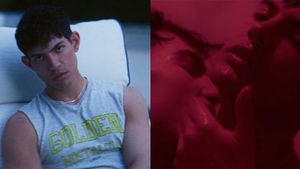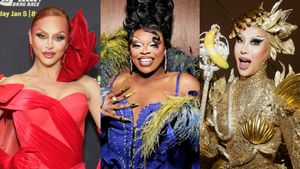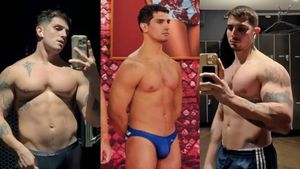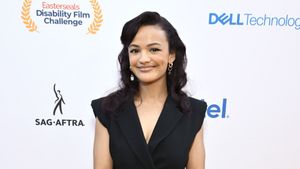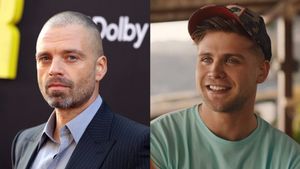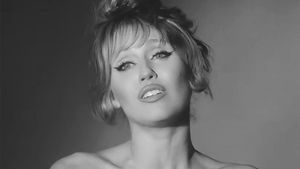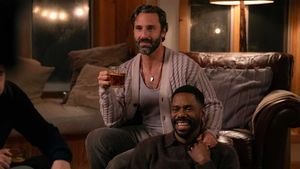Chucky, the latest installment in the Child’s Play franchise, premiered last week, and it’s every bit as good — and gay — as we could’ve hoped. The series follows in the footsteps of the seven films that preceded it, and although they aren’t required viewing in order to enjoy this new take, longtime fans will definitely find plenty to reward them. This time, the story focuses on Jake (Zachary Arthur), a young, artistic gay kid who’s struggling to find any safe place in his life. His father (Devon Sawa) doesn’t approve of his gay son and the kids in school single him out for ridicule. So, when he meets Chucky (Brad Dourif), a doll possessed by the spirit of a serial killer who accepts him and is more than happy to suggest ways he can unleash his frustration, Jake’s especially vulnerable to his dark influence.
Despite having a serial-killing doll at its center, Chucky isn’t all murder and mayhem — although there’s plenty of that, and its home network, SYFY, hasn’t shied away from allowing lots of gore on-screen. Jake also has a love interest in the form of his crush, Devon (Bjorgvin Arnarson), the cute boy in class with his own true-crime podcast. It’s a bit of wish fulfillment for Chucky’s out gay creator, Don Mancini, who craved these kinds of stories when he was growing up.

The series is also allowing Mancini to exorcise some demons of his own, and the writer-director has called it his most autobiographical project to date. “In the ’70s it was a different world then, and [things are] theoretically a bit better now. But not good enough. But you know, as a kid, a young gay kid, I was struggling with that... and you know, kids being kids, you get bullied,” Mancini recalls.
Aspects of the relationship Mancini had with his father also play out on-screen. For instance, Jake is an artist, which causes friction with his father, something Mancini can relate to. “Although, in my father’s defense, he did come around on that, he was ultimately supportive of my going into film,” Mancini says. However, he also recalls his father wanting nothing more than for him to be a “stud runner,” something he felt compelled to become as a result. “It was that aspect of my life that went into the character of [Jake’s cousin] Junior (Teo Briones), who’s sort of pushed on that by his father, who is reliving his own glory days,” Mancini explains.

Fatherhood is a theme that runs throughout the new series, with Chucky becoming a sort of surrogate father to Jake, whose own father rejects him while bullies at school are making his life miserable. But this role is nothing new for the killer doll. In Son of Chucky, audiences were introduced to Chucky’s gender non-conforming son, Glen. “Even though he’s a psychopathic killer, [Chucky’s] own life experiences brought him to a point where he can bond with this kid over this issue that he’s having so much trouble with,” Mancini says. “But [you have to] twist it, you know, because Chucky, of course, being Chucky, he has his own secret agenda.”
And because he’s Chucky, he’s also not exactly the ideal role model. His answer to dealing with bullies in the series? Murder, of course. A plotline like that invites viewers to draw comparisons to real-life instances of school violence, something Mancini intended to explore with the new series. “In this season of the show, we use Chucky as a metaphor for bullying. I mean, any good horror story needs to deal in metaphor, it can’t just be about a doll that’s possessed by a serial killer and goes around killing people. It has to be grounded in something universal, something archetypal,” he explains. That was seen from the franchise’s outset, with the first Child’s Play film using Chucky as a metaphor for children’s marketing run amok.

“One of the things we wanted to explore is what goes into making a bully? And is it possible to break that cycle of abuse?” says Mancini. Each of the teens in the show, whether they’re the target of bullies or bullies themselves, share one thing in common: they’re under a lot of pressure from other sources motivating their behavior. “So, one of the things ultimately I wanted to say was, how do you break the cycle of abuse? And I think we do provide an answer to that,” Mancini reveals. “And without giving away too much, I mean, I think it’s relationships, friendships, and love that can bring you back from the edge.”
While Mancini hopes all audiences take something away from his messages in the series, it’s the young queer audience he really hopes to reach. “The most important thing to me is that young, teenage gay kids who are fans of horror, that they see themselves represented,” he says. “I just think it’s important to normalize this to whatever degree we can. And you know, we’re seeing more and more queer characters in the genre. And that’s great.” But Mancini is taking things further than just ensuring representation in the series. “I think what's a little new here with the show is dealing with kids at this age at the age of 14, 15. And they’re dealing with their emerging psychologies and emerging sexual...interest and romantic hopes, all of that stuff,” he explains, adding, “I just want 14-year-old gay kids to watch this and think, not only is it OK, it’s cool.” That shouldn’t be a problem, as the Chucky series is, well, killer.
Chucky airs Tuesdays on the SYFY and USA networks. Watch the trailer below:













































